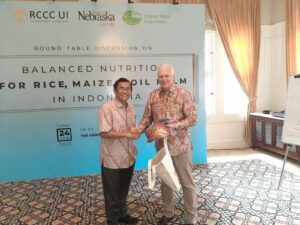
The need for nutrients in plants is an important factor for agricultural productivity, especially in Indonesia. Potassium (K) deficiency in oil palm plantations, for example, is specifically known to hamper its productivity which eventually has the potential to hinder national economic growth and the lives of small farmers.
These findings were put forward in The Round Table Discussion on Balanced Nutrition for Rice, Corn, and Oil Palm organized by the Research Center for Climate Change (RCCC), Faculty of Mathematics and Natural Sciences, Universitas Indonesia (FMIPA UI) and the University of Nebraska, Lincoln, Global Yield Gap Atlas Project (GYGA), at Hermitage Hotel Jakarta, last Tuesday (24/1).
“This discussion highlights the urgent need for collective initiatives from relevant stakeholders. This is done to redirect agricultural research and extension programs as well as improve the fertilizer subsidy program to ensure adequate and balanced nutrition for rice, corn, and oil palm plants of small farmers,” said Prof. Jatna Supriatna, Ph.D., the Professor of Biology FMIPA UI as well as a senior researcher at the RCCC FMIPA UI.
This round table discussion held in Jakarta offered a first step to forming a joint initiative between the University of Nebraska-GYGA, Universitas Indonesia, Pupuk Indonesia, the National Research and Innovation Agency (BRIN), the Coordinating Ministry for Economic Affairs of the Republic of Indonesia, the Palm Oil Plantation Fund Management Agency (BPDPKS), Indonesian Oil Palm Research Institute (IOPRI), and the Ministry of Agriculture to address the problem of nutritional imbalances for rice, corn, and oil palm in Indonesia. The stakeholders who attended the activity agreed to share the main findings from research projects conducted from 2015 to 2023 in Indonesia.
The GYGA team, led by Professor Patricio Grassini together with Indonesian partners from BRIN and PPKS, have undertaken a research project to identify the main constraints to yield potential in Indonesia for rice, corn, and oil palm on small farmers’ lands. Research on rice and corn began in 2015 while research on oil palm began in early 2018 until 2023.
Meanwhile, a research team led by University of Nebraska together with local partners from BRIN, PPKS, and UI identified that one of the constraints on the yield of small farmers’ lands in Indonesia is triggered by poor and unbalanced nutrition in plants. This is caused by several factors, such as the lack of knowledge of farmers about the right source of fertilizer, difficulties in obtaining fertilizer, and the lack of purchasing power of farmers for this fertilizer.
“The main finding of this research project is that Potassium (K) limits yields in most small farmers’ fields for rice, corn, and oil palm crops in Indonesia,” said Prof. Jatna.
In this discussion, participants discussed mechanisms for providing proper nutrition for rice, corn, and oil palm fields in Indonesia and worked on solutions for that constraint, such as identifying ways to make a positive impact for the majority of small farmers through increasing plant nutrition from fertilizers.
From the discussion, the next step has been decided that a consensus document signed by the participants would be issued. The consensus document is addressed to government leaders who are responsible for adjusting the approach to the fertilizer subsidy program needed by crops, especially oil palm, so that it can be fully more intensive on crop yields, especially during critical times.



